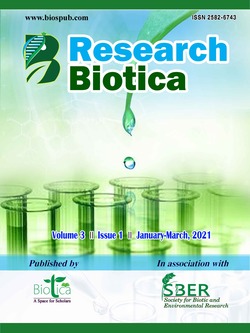
Mobile SMS Advisories: An Analytical Study among Farmers
Prabha D.*
Dept. of Agricultural Extension and Rural Sociology, Tamil Nadu Agricultural University, Coimbatore, Tamil Nadu (641 003), India
Arunachalam R.
Dept. of Agricultural Extension and Rural Sociology, Tamil Nadu Agricultural University, Coimbatore, Tamil Nadu (641 003), India
DOI: https://doi.org/10.54083/ResBio/3.1.2021.33-36
Keywords: Adequacy, Farmers, Mobile phone, Relevancy, Timeliness
Abstract
Mobile phones play a major role to aid the farmers in promoting production activities. Tamil Nadu is a prime state in India witnessed huge volume of subscribers of mobile agro services from public advisories and also private advisories. Public mobile advisory system in the biggest service provider in Tamil Nadu where the Tamil Nadu Agricultural University (TNAU) and the state department of agriculture are two big monsters providing advisories to the farmers through SMS. The study was conducted in Annur and Kinthukadavu blocks of Coimbatore district of Tamil Nadu with a sample of 200 farmers subscribing the SMS based agro advisories. The study revealed that little more than two-third of the respondents (67.50%) were using ordinary mobiles. Majority of the respondents (74.00%) expressed that the technical input on advance warning of weather risks was adequate, With regard to the inadequate services, cent percent of the respondents had expressed that the information on cold storage networks and transportation were inadequate. Most of the respondents (87.00%) expressed that they received relevant of messages on plant protection, With regard to non relevancy of the messages, cent percent of the respondents pointed out messages on cold storage networks and transportation. An overwhelming majority of the respondents (95.50%) had expressed that they received timely messages on advance warning of weather risks, with regard to the untimely messages, advisories on cold storage networks and transportation (100.00%). Cent percent of the respondents’ preferred only text based messages.
Downloads
not found
Reference
Furuholt, B., Matotay, E., 2011. The Developmental Contribution from Mobile Phones across the Agricultural Value Chain in Rural Africa. EJISDC 48(7), 1-16.
Mittal, S., Tripathi, G., 2009. Role of Mobile Phone Technology in Improving Small Farm Productivity. Agricultural Economics Research Review 22, 451-459.
Patra, J., Singh, D.V., Pati, J.K., 2016. Kisan Mobile Advisory Service- An effective ICT tool for technology dissemination. International Journal of Humanities and Social Science Invention 5(6), 68-72.
Torero, M., von Braun, J., 2006. Information and Communication technologies for development and poverty reduction - The potential of telecommunication. The Johns Hopkins University Press and IFPRI, Washington, DC.
World Bank, 2007. Agriculture for Development. World Development Report, 2008. The International Bank for Reconstruction and Development/World Bank, Washington, DC.
